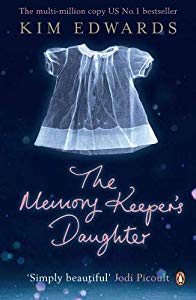 The Memory Keeper’s Daughter, Kim Edwards
The Memory Keeper’s Daughter, Kim Edwards
There is a common term for many traditionalists today, decrying our ‘throwaway culture’. Used in Pope Francis’ encyclical Laudato Si’ it’s used by many in the environmental community now to refer to our habit of single use objects and wastefulness. But in Lauadto Si’ and other Catholic writings, particularly those on abortion and euthanasia, it also refers to throwing away people who would be inconvenient. I agree that there are troubling ways in the modern world that we prioritize convenience over obligation to community and family, and that we need to build a support for one another in society. But haranguing today’s society – and liberals—for wanting to do away with inconvenient people ignores the absolute horror of life for people with mental or intellectual disorders for almost all of life, really until a PC culture of the 70s and 80s.
The Memory Keeper’s Daughter addresses many of the bizarre realities of life not so very long ago. Set in 1964, a couple rush to the hospital with the wife in labor. In the first few pages of the book, Norah Henry gives birth to a son, Paul. And then, shortly after, a girl, Phoebe, who her husband, Dr. David Henry, quickly realizes has down syndrome. He makes the decision to ask his nurse, Caroline Gill, to take the child to a sanitorium he knows of and tells his wife that the second child, a daughter, was stillborn.
This lie is the foundation of the story, which switches perspectives to follow both Caroline Gill and the Henry’s. Upon seeing the sorry state of the sanitarium, Caroline Gill cannot bring herself to leave the newborn there, in a dilapidated building with an indifferent staff. Instead, she drives off with the child creating a new life for herself, passing the girl, Phoebe, off as her own daughter. The book follows not only her own narrative, charting a course for her and Phoebe, but also fighting for legal rights for children with Down Syndrome and disproving the prevailing thoughts on what they were able to do. The book is not overly preachy, but it is also clear about the lack of any sort of not only support but any expectation or even allowance that someone with Down Syndrome could lead a life.
Within the Henry’s life, the lie slowly eats away at them. Norah becomes increasingly depressed and isolated, not only grieving what she believes was a stillborn daughter but also having been denied (because of the nonexistence of a body) a funeral or opportunity to grieve. Dr. David Henry is adamantly opposed to the idea of a funeral and doesn’t understand why it was necessary. He also becomes increasingly distant, and, being haunted by the fact of a child with Down Syndrome, rejects out of hand the idea of having another child, with no discussion or explanation to poor Norah. This distance eats away at and destroys their marriage, and seeps into their son as well.
This seems a maudlin setting for a book, but it is exceptionally well done. Even with such an emotional topic, I never felt that I was being manipulated or steered by the narrative, or that it seemed contrived. The initiating event is terrible, without a doubt, but also very believable for an event in 1964, when anyone with a disability could be hidden away in a sanitarium and never spoken about, and when there was still a ways to go before it might be expected that women could be told about their own lives. My own grandmother had a miscarriage and full hysterectomy and when my mother, experiencing some health problems, tried to ask why, my grandmother said that she was never told why (!!!!) and that women wouldn’t have talked about such things. Turn TMC on late at night for a cross section of older movies to watch story after story of everyone agreeing that a woman couldn’t possibly handle the truth about her own health or her child or loved one.
The Memory Keeper’s Daughter handled a story that could have been just too in your face and manipulative with sensitivity and realism. Reading of the Henry’s life was tragic, but the story was not overly sad and was moving and intriguing throughout. I really loved this story, and it shined a light on a part of our own society’s history that was reality not too long ago at all. I have thought about it for ages afterwards.
Filed under: Book Reviews, books, literature | Tagged: bestsellers, book review, bookclub books, books, disability, fiction, kim edwards, the memory keepers daughter |


Leave a comment